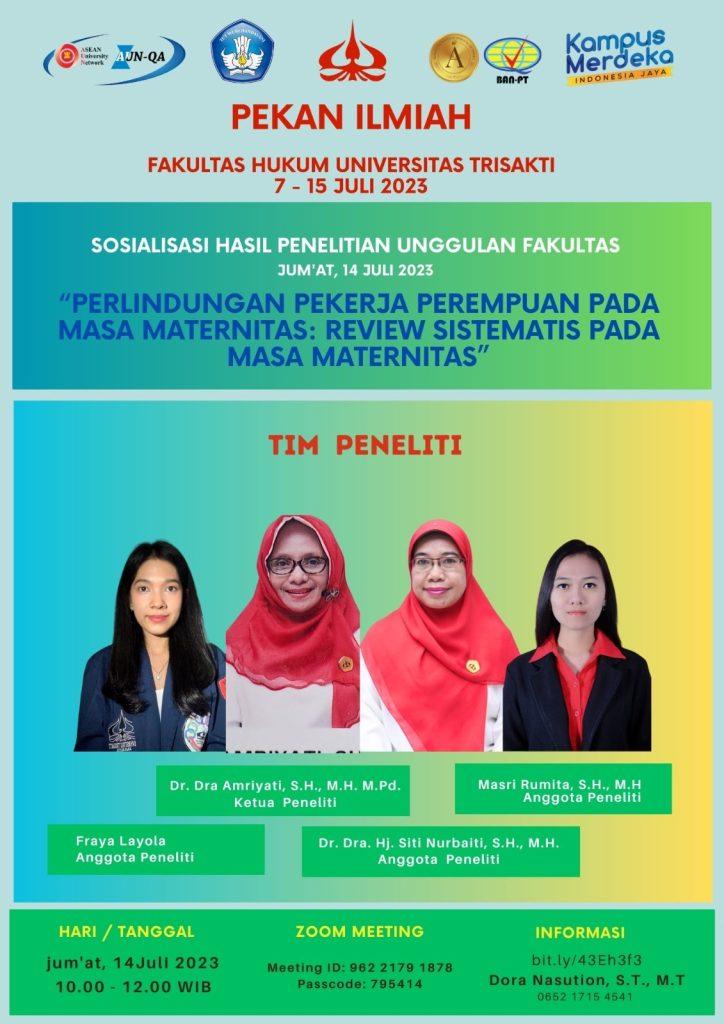Contact Us
- JL. Kyai Tapa No. 1 Grogol
- Jakarta Barat, Indonesia
- Phone:
- (62-21) 566 3232
- Whatsapp:
- (+62) 882 194 856 74
- (+62) 877 707 077 03
- Fax: (62-21) 564 4270
- Email: humas@trisakti.ac.id

“Scientific Week of Faculty’s Outstanding Research & Book Grant,” day six on July 14, 2023 presenting Dissemination of Faculty’s Outstanding Research Results (PUF) in order to socializing the implementation of Faculty’s Outstanding Research.
Dissemination PUF Result Topic
Research Team Leader: Dr. Dra. Amriyati, M.Pd., SH., MH.
Research Team Members: Dr. Dra. Siti Nurbaiti, S.H., M.Hum.
Masri Rumita, S.H., M.H.
Student: Fraya Layola (010002000265)
Date and Time: Friday, July 14, 2023, from 10:00 to 12:00 WIB
Zoom Meeting Details:
Meeting ID: 962 2179 1878
Passcode: 795414
Research Summary
Forty percent (40%) of workers worldwide are women. Work has a positive impact on family, community, and economic welfare (GALLUP and ILO 2017, WHO Document 2011). If Indonesian women do not breastfeed, the cost of purchasing formula milk is US$1.5–9.4 million per year (Australia Indonesia Partnership for Economic Governance, 2017). The number of productive-age workers (15–49 years) in Indonesia is 33.6 million. ILO data shows that paid maternity leave covers only 10 to 32% of all female workers, which is not yet optimal. Globally, more than 800 million women lose their economic protection due to childbirth, affecting the welfare of women and children (World Health Organization, 2018). In Indonesia, some women do not receive maternity leave, but they dare not speak up for fear of losing their jobs (Better Work Indonesia, 2017). Maternity protection can reduce medical costs, provide a balance between work and personal life, thus increasing workers’ morale and loyalty to the company. Maternity protection is indicated by constitutional mandates and related regulations: maternity leave, income during maternity leave, and its funding sources (insurance, state, company, or combination), nursing breaks, and breastfeeding facilities at the workplace. Despite the availability of international and national legal instruments in Indonesia related to worker protection during maternity, the ideal situation has not been achieved, as per Ihering’s theory, which states that the law protects individual and collective rights where rights involve interests, and the law protects individual and collective interests. In this context, the law must protect women’s and employers’ rights and interests individually and collectively with a spirit of togetherness and brotherhood, according to Duguit. The existence of workers who do not receive maternity leave or lose their sources of income due to childbirth reflects an imbalance between work and personal life for some female workers. Further research is needed to uncover why legal instruments related to maternity protection have not been effective for some female workers.
Let’s join !
We highly encourage the academic community of Trisakti University, especially students majoring in Labor Law or other relevant fields in the Faculty of Law, to attend this event. Don’t forget, e-certificates will be provided for participants attending this event.